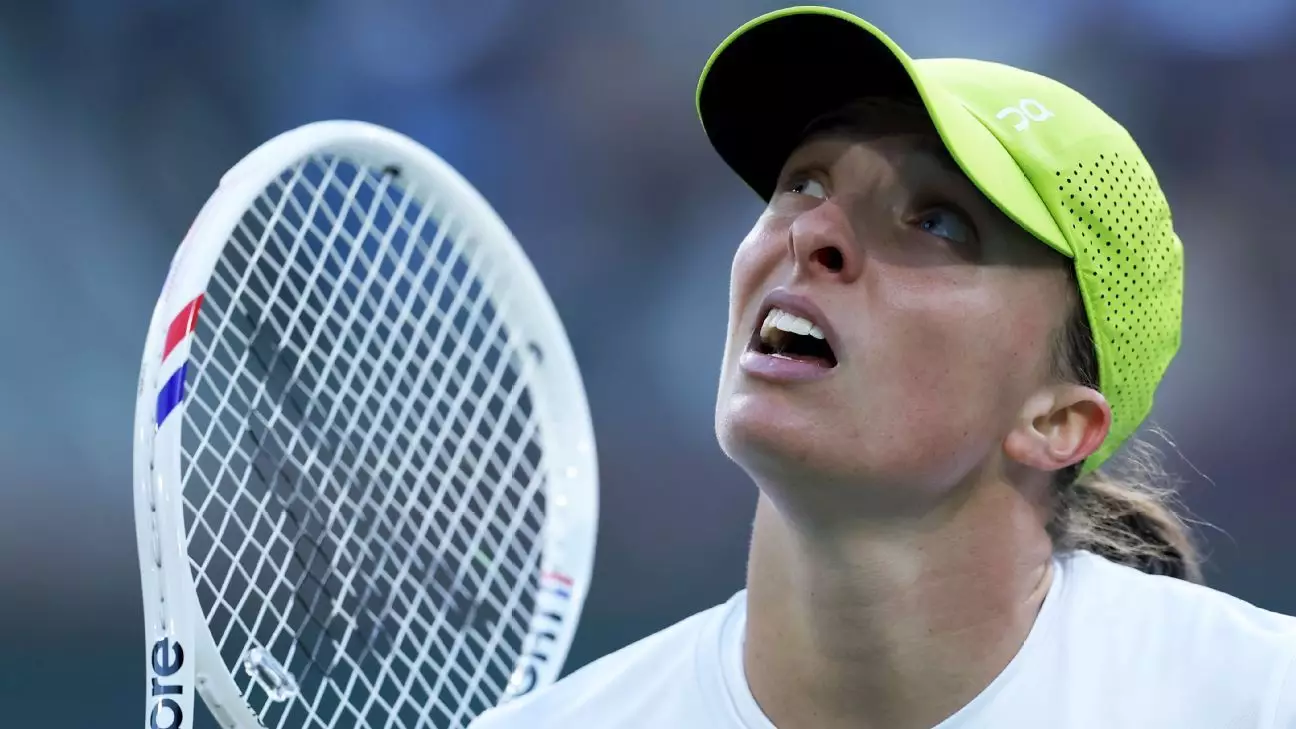Iga Swiatek, one of the most visible talents in women’s tennis today, recently shared a poignant and candid reflection on the emotional turmoil she has faced in recent months. Stemming from personal experiences of criticism and immense pressure, her vulnerability provides a window into the struggles that many elite athletes encounter. In a social media post that garnered widespread attention, Swiatek spoke out against the relentless expectations in sports, where fans and critics alike often wield their judgments as weapons, disregarding the human element of these athletes’ lives.
Swiatek’s emotional transparency is an interesting lens through which to view the mental health of athletes. With the mounting pressure of scrutiny affecting her mental well-being, it’s compelling to see how the duality of public perception—where controlled emotions can be interpreted as robotic and expressive showcases of frustration lead to being labeled hysterical—can warp an athlete’s relationship with their sport. In this age of social media, it becomes increasingly important to recognize that every return of a serve or expression of frustration is not merely an act of sportsmanship but a manifestation of intricate human emotions.
Frustration on Display
Delving into specific incidents, Swiatek highlighted a moment during a semifinal match at Indian Wells, where a misdirected ball almost struck a ball boy. While her intention was merely to vent frustration, the repercussions were significant—the uproar that followed encapsulated the volatile nature of public perception. This incident, while seemingly trivial, took on a life of its own, illustrating how easily one misstep can spiral into widespread condemnation.
In her reflection, she candidly admitted her discomfort with her own emotional outburst, but she also illuminated an important point: even the best players can misjudge their reactions in high-pressure scenarios. The exchange with the ball boy, where mutual understanding and apologies were exchanged, showcased the humanity behind the athlete. Swiatek’s narrative serves as a reminder that, amidst the physical excellence exhibited on the court, is a person grappling with real emotions and vulnerabilities.
The Crippling Judgments
Moreover, Swiatek’s comments regarding the “constant judgment” she faces highlight a broader societal issue pervasive within competitive environments. The scrutiny of public figures in sports transcends mere performance metrics; it often delves into character evaluations, which can be especially damaging. Her lamentations resonate with many athletes who find themselves caught in a whirlwind of criticism, sometimes for actions beyond their control.
The outrage over her spontaneous display of emotion, which mirrored the beliefs of countless critics, underscores a critical contradiction. When athletes attempt to maintain a stoic facade, they are often criticized for lacking passion. Conversely, when they exhibit emotions, they are derided for immaturity. This paradox appears especially magnified within the realm of sports, where the line between strength and vulnerability blurs, and expectations run rampant.
Understanding Mental Health in Sports
Swiatek’s self-reflection touches on the important topic of mental health—a subject that remains taboo in many competitive settings. Her acknowledgment of spending significant time dealing with tears and anguish presents a stark contrast to the polished image we’ve become accustomed to seeing on the courts of Miami or Roland Garros. In today’s climate, where mental wellness is finally gaining traction, Swiatek’s public admission could serve to destigmatize the challenges that athletes face, normalizing the narrative that struggling emotionally is not a sign of weakness, but rather an inherent part of human experience.
As Swiatek grapples with the relentless burdens placed upon her, both in her career and the fallout from the doping incident involving a tainted supplement, her journey invites fans to practice empathy over judgment. It emphasizes the notion that sports, while thrilling, can simultaneously encompass profound challenges that extend far beyond the game itself.
Balancing Public Persona and Private Struggles
The complexities of balancing a public persona with personal struggles are a profound theme resonating throughout Swiatek’s narrative. Her fight for self-acceptance amidst external pressures highlights a critical framework for understanding the psyche of an athlete. The journey of navigating societal expectations while remaining true to oneself is a reality many professionals encounter, and Swiatek’s candidness serves to inspire others who might find themselves in similar positions.
In an era where vulnerability can be mistaken for weakness, Swiatek’s openness offers a refreshing perspective on the pursuit of excellence in sports. Rather than merely focusing on accolades and wins, her story encourages a broader discourse surrounding the mental and emotional labor intertwined with athletic success. As fans and supporters, understanding this intricate balance fosters a deeper appreciation for not just the athlete, but the individual behind the accolades.


Leave a Reply